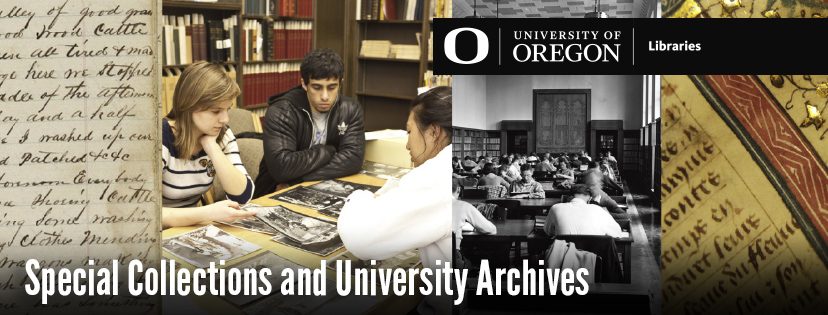Celebrating National Hispanic Heritage Month
~Guest post by David Woken, History and Latin American Studies Librarian, for National Hispanic Heritage Month
 Spanish-speaking peoples have shaped Oregon for centuries, and the University of Oregon Libraries are committed to making sure that role is understood. The first Europeans to explore the Oregon coast were acting on behalf of the Spanish Empire in the 1700s and left a legacy of geographical names, including Heceta Head (named for Spanish naval officer Bruno de Hezeta y Dudagoitia), Tierra del Mar, Umatilla, and many more that are still used today. In the 1800s, as the U.S. exerted control of the lands that are now Oregon and Anglo-American setters moved in, Latino mule traders from the formerly Mexican territories of California and Nevada provided guidance and logistical support to soldiers and settlers from the U.S., and Californian vaqueros (origin of the English word buckaroo) established the work practices and culture we associate with the cowboys and ranchers of the Oregon’s high plains.
Spanish-speaking peoples have shaped Oregon for centuries, and the University of Oregon Libraries are committed to making sure that role is understood. The first Europeans to explore the Oregon coast were acting on behalf of the Spanish Empire in the 1700s and left a legacy of geographical names, including Heceta Head (named for Spanish naval officer Bruno de Hezeta y Dudagoitia), Tierra del Mar, Umatilla, and many more that are still used today. In the 1800s, as the U.S. exerted control of the lands that are now Oregon and Anglo-American setters moved in, Latino mule traders from the formerly Mexican territories of California and Nevada provided guidance and logistical support to soldiers and settlers from the U.S., and Californian vaqueros (origin of the English word buckaroo) established the work practices and culture we associate with the cowboys and ranchers of the Oregon’s high plains.
But it is in the Twentieth Century that Oregon’s Latino community grew to the importance it has today. Migrant farmworkers from Mexico and the southwestern states, especially California, New Mexico, and Texas, came to Oregon to work in the fields and orchards of the Willamette, Rogue River, Hood River, and Snake River Valleys. From 1942 to 1947 the Bracero Program brought Mexican guest workers on temporary passes to alleviate labor shortages in Oregon’s fields. Mexican workers continued to come to Oregon throughout the latter half of the century, following the routes their friends and relatives had paved before them. By the 1960s and 1970s Oregon’s Latino community came into its own as young Chicano students formed chapters of the Movimiento Estudiantil Chicano de Aztlan (MEChA) at Oregon’s universities, Oregon became home to the U.S.’s first Chicano institution of higher education, the Colegio Cesar Chavez in Mount Angel (1973-1983), and migrant laborers organized for legal support and workplace rights through organizations like the Valley Migrant League, the Willamette Valley Immigration Project (WVIP), and the Pineros y Campesinos Unidos del Noroeste (Northwest Treeplanters and Farmworkers United, PCUN). Today Latinos are the largest ethnic minority in the state, and include among their ranks contract reforestation workers, farmworkers, lawyers, business owners, politicians, and many more. The University of Oregon Libraries are committed to ensuring that the story of the state represents the crucial importance of the Latino community.

Our collections contain a variety of materials that help scholars of today and tomorrow to tell the story of Oregon’s Latino heritage. The John Little Papers document the work the Valley Migrant League did in the 1960s to alleviate the poor housing and working conditions of the Willamette Valley’s largely Latino migrant farmers, as well as the struggles to found and keep open the Colegio Cesar Chavez. The Jefferson Center for Education and Research Records document the lives of rural workers in various industries throughout Oregon, Washington, and Northern California, many of them Latino, from forest plant foragers to reforestation workers to migrant farm laborers. The U of O’s chapter of MEChA houses its papers in Special Collections and University Archives as well, documenting Latino student life at UO for future generations. And the PCUN Records document the work of the dedicated activists and organizers of the Willamette Valley Immigration Project and PCUN, providing a window into the lives of working class Latinos in the Willamette Valley from the 1970s to the present that is unmatched in any other collection. Together with dedicated scholars, students, and activists at the UO and in Oregon more broadly the UO Libraries are working to ensure that now and for future generations, Latino history is Oregon history.
See other highlighted stories about National Hispanic Heritage Month in Around The O here and here.

